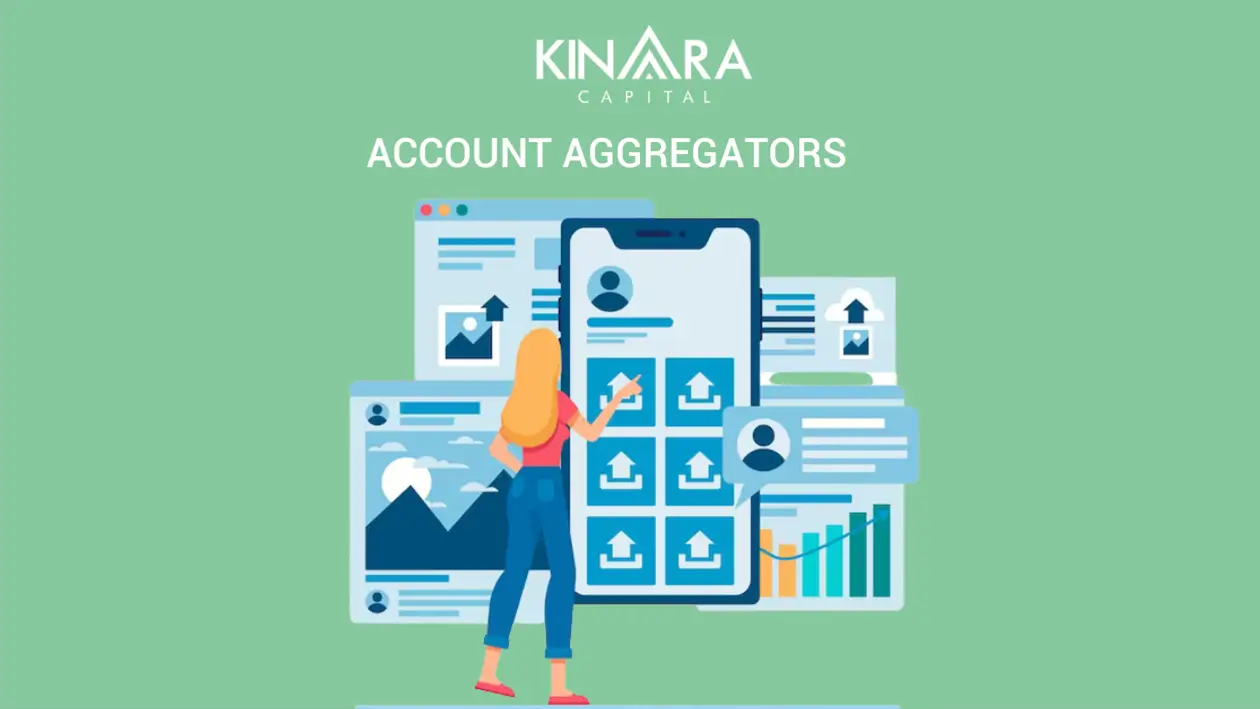
In today’s fast-paced digital era, managing personal finances can be a daunting task. With multiple bank accounts, credit cards, loans, investments, and insurance policies scattered across various financial institutions, staying on top of one’s financial affairs becomes increasingly challenging. However, thanks to the emergence of Account Aggregators, individuals and businesses now have a powerful tool at their disposal to streamline and simplify their financial management processes. In this blog, we will delve into the world of Account Aggregators, exploring their features, benefits, and the transformative impact they are having on the financial landscape.
Account Aggregators are financial intermediaries that enable individuals and businesses to securely and seamlessly access their financial information from various sources in one place. They act as facilitators between users and financial institutions, consolidating data from multiple accounts and presenting it in a unified manner.
Account Aggregators primarily operate in the context of Open Banking, a framework that promotes the sharing of financial data through standardized application programming interfaces (APIs). These APIs allow authorized third-party providers, such as Account Aggregators, to access financial information from banks, insurance companies, mutual funds, pension funds, and other financial institutions.
The key features and benefits of Account Aggregators include:
Account Aggregators retrieve financial data from multiple sources, including bank accounts, credit cards, loans, investments, and insurance policies. By consolidating this information, users can view their entire financial picture in one place, simplifying financial management. This consolidated information can also be accessed by financial institutions with the consent of the customer.
Account Aggregators adhere to a consent-based model, where users explicitly grant permission to access their financial data. This ensures that users have control over their information and can choose which institutions and services can access it.
Account Aggregators enable the development of innovative financial services and products. With access to a comprehensive view of a user’s financial data, businesses can offer personalized financial advice, budgeting tools, loan and credit offerings, investment recommendations, and more.
Access to comprehensive financial data facilitated by Account Aggregators not only reduces fraud risks but also empowers lenders to assess the creditworthiness of individuals and businesses more accurately. By analyzing transactional data and financial patterns, lenders gain deeper insights into an applicant’s financial behaviour, allowing them to make more informed decisions when evaluating loan applications. This data-driven approach enables lenders to assess risk more effectively, potentially expanding access to credit for individuals without traditional credit histories and fostering fairer lending practices overall.
Account Aggregators prioritize data security and privacy. They employ robust encryption and authentication mechanisms to ensure that sensitive financial information is protected. Additionally, they operate within the regulatory frameworks and guidelines set by the respective financial authorities in their jurisdiction.
The AA ecosystem operates on the principle of “consent-based data sharing.” Users have the ability to grant or revoke consent for data sharing at any time, ensuring they maintain control over their financial information. The data shared through the AA ecosystem is typically in a standardized and machine-readable format, enabling easy integration and interoperability between different financial service providers. The AA ecosystem typically consists of four key entities:
The Account Aggregator acts as a central platform that facilitates the exchange of financial information between users and financial institutions. It operates as an intermediary and adheres to strict security and privacy protocols to ensure the confidentiality and integrity of the data.
FIPs are the financial institutions or entities that hold the customer’s financial data, such as banks, mutual funds, insurance companies, pension funds, and credit card companies. These entities participate in the AA ecosystem by providing access to the user’s financial data upon their consent.
FIUs are the service providers, such as banks, fintech companies, wealth management firms, or any other entities, that offer financial services to users. They utilize the AA framework to request and receive financial data from FIPs with the user’s consent.
Users are individuals or organizations that have financial accounts with various FIPs. They initiate the sharing of their financial data through the AA platform and have control over which FIUs can access their information and for how long.
Users can access their financial information from multiple sources through a single platform, eliminating the need to individually log in to each financial institution’s website or app.
FIUs can provide personalized and value-added services by analyzing a user’s consolidated financial data. For example, they can offer better financial planning, investment advice, or customized loan offerings based on the user’s financial profile.
Lenders can make more informed lending decisions by accessing a user’s comprehensive financial data, reducing the reliance on traditional credit scoring models.
The AA framework enforces strict security measures and privacy protocols to protect user data. Users have control over data sharing and can monitor and manage access to their financial information.
Customers will have a single view of their financial information, which will make it easier to track their spending and manage their finances.
Customers will be able to make better financial decisions by having access to more accurate and up-to-date information.
The Account Aggregator ecosystem can help reduce fraud by minimizing the number of log-ins and points of contact individuals have with multiple service providers. With traditional financial services, customers often need to log in and provide sensitive information to various institutions, increasing their vulnerability to fraud and phishing attempts. In contrast, the AA framework consolidates financial data and allows customers to grant permission for data access to authorized institutions. By reducing the number of log-ins and interactions, the AA ecosystem makes it more challenging for fraudsters to access customer data, enhancing data security and mitigating the risks associated with fraud and phishing.
The AA ecosystem will make it easier for new financial services providers to enter the market, which will lead to more competition and better prices and experiences for consumers.

The Reserve Bank of India (RBI) has approved some Account Aggregators (AAs) in India. These AAs are responsible for facilitating the sharing of financial information between customers and financial institutions in a secure and privacy-preserving way. Here is the list of a few AAs in India:
The future of Account Aggregators in India appears promising and holds great potential for transforming the financial landscape. The introduction of the Account Aggregator (AA) framework by the Reserve Bank of India (RBI) has set the stage for significant advancements in data sharing and financial services. Here are some key aspects that shape the future of Account Aggregators in India:
Account Aggregators have the potential to bridge the gap between individuals and financial services. They enable easier access to financial products and services for underserved segments of the population, including those without traditional credit histories. By providing a consolidated view of financial data, Account Aggregators can facilitate better credit assessment and enable more inclusive lending practices.
Account Aggregators enable fintech companies to leverage user-permissioned financial data for personalized solutions, leading to new products and services. They provide comprehensive and real-time financial data for deeper insights into user behaviours, allowing financial institutions to offer tailored products, targeted marketing, and proactive advice for better customer experiences.
Account Aggregators can simplify and streamline processes that require access to financial information. For instance, loan applications, insurance underwriting, or investment account opening can be made more efficient by eliminating the need for manual document submission and verification. Account Aggregators can facilitate seamless and secure sharing of financial data, reducing paperwork and enhancing the user experience.
The AA framework prioritizes data privacy and security by implementing stringent regulations and guidelines. User consent and control over data sharing are central to the ecosystem, ensuring that individuals have the power to manage and monitor their financial information. Continued emphasis on data protection will enhance user trust and encourage broader adoption of account aggregator services.
As the account aggregator ecosystem evolves, collaboration among stakeholders will play a crucial role. Financial institutions, fintech companies, regulators, and technology providers need to work together to establish common standards, interoperability, and secure data exchange protocols. This collaboration will enable seamless integration of account aggregator services into the existing financial infrastructure and ensure a consistent user experience.
The future of Account Aggregators in India holds immense potential to revolutionize financial services, enhance customer experiences, and drive financial inclusion. With the support of regulators, industry players, and technological advancements, Account Aggregators are poised to play a significant role in reshaping the Indian financial ecosystem in the years to come.

Non-Banking Financial Companies (NBFCs) can leverage Account Aggregators to enhance their operations in several ways. By incorporating Account Aggregators, NBFCs can improve their credit assessment processes. Access to real-time and comprehensive financial data through Account Aggregators allows NBFCs to make more informed lending decisions, considering factors beyond traditional credit scores. This detailed financial information provides a holistic view of an applicant’s financial health, transaction patterns, and repayment capacity, enabling NBFCs to offer more personalized and tailored loan products.
Account Aggregators streamline customer onboarding and underwriting processes for NBFCs. Instead of requiring customers to submit physical documents and multiple bank statements, NBFCs can leverage account aggregator services to access the necessary financial data directly. This approach reduces paperwork, minimizes manual errors, and accelerates the underwriting process, enabling NBFCs to provide faster and more efficient services to their customers. By incorporating Account Aggregators, NBFCs can enhance their operational efficiency, improve customer experiences, and gain a competitive edge in the market. By integrating Account Aggregators, NBFCs leverage real-time financial data, streamline operations, and provide personalized solutions. This technology-driven approach improves credit assessments, expedites services, and boosts customer satisfaction, fostering business growth.
Kinara Capital, a Systemically Important, RBI-registered NBFC in India is determined to help the MSME sector by providing business loans, and keeping the data of its customers safe and private. As per research by CRISIL in the year 2022, MSMEs are hesitant to share their financial data with online portals due to the risk of various threats, Kinara’s fully secure digital platform ensures that all the customer data is kept confidential and safeguards it against any breaches that can endanger sensitive information.
Account Aggregators in India hold immense potential to reshape the financial services industry, driving positive changes and increasing financial inclusion. By consolidating financial data and bridging the gap between individuals and services, they enable better credit assessment and access to loans for those without traditional credit histories, uplifting the economy.
Furthermore, Account Aggregators promote innovation by creating an ecosystem for fintech companies and service providers to leverage user-permissioned financial data, leading to personalized solutions and improved user experiences. As a result, data-driven financial services are being bolstered by Account Aggregators, empowering institutions to offer personalized products, targeted marketing, and proactive financial advice, enhancing customer experiences and informed decision-making.
Collaboration and standardization among stakeholders are crucial for their future success. By working together, financial institutions, fintech companies, regulators, and technology providers can establish common standards and ensure secure data exchange, creating a consistent and reliable user experience. Ultimately, prioritizing data privacy and security gives individuals greater control over their financial information, fostering trust and broader adoption of Account Aggregator services.
In summary, the future of Account Aggregators in India is promising, with the potential to revolutionize financial services, drive financial inclusion, and enhance the customer experience. With ongoing collaboration, technological advancements, and a focus on data privacy, Account Aggregators will transform the Indian financial landscape for the better.
